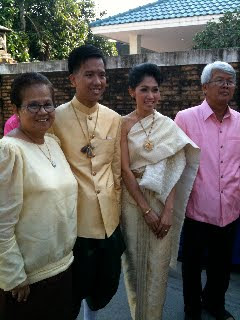Asian weddings touch my heart! I had been moved just listening to stories of Asian weddings but when I recently attended my first traditional Thai wedding ceremony, I definitely had teary eyes. What was it that invited such emotion? What was different from the numerous Canadian weddings and wedding receptions that I have attended?
How a couple arrives at their wedding varies dramatically around the world. Of course I do not mean how they transport themselves to their wedding to be united as “one” but rather the journey they took to become a couple.
In some countries, such as Qatar, the decision to marry is totally a family decision rather than a couple decision. Families will “arrange” who they believe is the best match for their beloved son or daughter. And as one young woman told me, “who knows you better than your parents? We trust they will find the best man for us”.
With Muslim families in England, a more combined approach of family and the prospective “couple” are involved in the matchmaking and eventual decision to marry. A lovely narrative of this process is beautifully described by Shelina Zahara Jammohamed. In her book “Love in a Headscarf”, she offers her graceful, witty, and eloquent personal account of her search for The One. Although her family did the eventual vetting of “the one”, the couple did have input into this most important of all life decisions. In a serendipity meeting in Qatar, I was able to enjoy more of her ‘search story’ from this talented and warm author.
Marriages in Canada are predominantly a couple decision with each partner’s family simply hoping (and sometimes praying) that good choices will be made by their sons and daughters in their mate selection. Even if families are reluctant or worse yet, opposed to their son or daughter’s choice of a future spouse, family worries or reactions will rarely deter the couple from moving forward to marriage. Couples in North America believe that love comes first and then a marriage and that the couple knows best. However in Asia, the belief is that marriage comes first and love will follow as one respects and honors their spouse and that parents can help significantly with this decision of who to marry.
But what was it specifically that invited me to be become emotional during the Thai wedding ceremony? It was the honor, respect and reverence for the advice and blessings from their elders. Once the religious part of the wedding ceremony was completed with the Buddhist monks, the couple now invited each elder couple or individual into the family room to offer advice and a blessing for their marriage.
The couple knelt before each of their elders and listened intently while the advice and blessings were offered. Yes, this ritual indeed brought tears to my eyes for the reverence that I experienced from this young couple towards their elders. When I asked what did this young couple think about the advice that was offered, they told me that they “long for this day and their advice”.
I have been invited by my own niece, nephews, children of my friends and friends to participate in a meaningful way in their weddings and have even been honored to offer words of advice or recommendations at the wedding reception. Even though I believe my advice was appreciated and respected, I do not think it carried the same weight or significance as the advice that was offered to this young Asian couple. Why?
I believe the Thai context set the stage for the advice and blessings that created a sacred space. The young Thai couple selected just a few family members and friends to be with them as they received their advice and blessings. Advice for couples in Canadian weddings is offered in front of all the wedding guests following the wedding ceremony. The wedding reception is a time of celebration and fun that perhaps doesn’t mix with serious advice, recommendations, and blessings for a marriage. Or could it also be that the family is part of the entire process that brings a couple to their sacred and special wedding day, or is it that elders are more revered in Asian families or is it something deeper and different about our cultures? I think perhaps it is all of that. Yes, Asian weddings make me cry!
What can we seniors and elders do to help our young couples move toward marriage in a way that is both a couple and family decision culminating in a mutual honoring of the couple AND the family at the wedding ceremony?
Lorraine



3 Responses to “Weddings: A Time for Advice and Blessings from Family Elders?”
Together with almost everything which appears to be developing inside this particular subject matter, a significant percentage of opinions are rather stimulating. Nevertheless, I appologize, because I do not subscribe to your whole plan, all be it refreshing none the less. It would seem to me that your comments are actually not completely rationalized and in fact you are yourself not even entirely confident of your assertion. In any case I did take pleasure in reading through it.
The crux of your writing while sounding reasonable originally, did not really settle very well with me personally after some time. Someplace within the paragraphs you managed to make me a believer unfortunately just for a while. I however have a problem with your leaps in assumptions and you would do nicely to fill in those gaps. In the event you actually can accomplish that, I will definitely be fascinated.
Samui Island Weddings…
[…]Weddings: A Time for Advice and Blessings from Family Elders? | The Wright Perspective[…]…